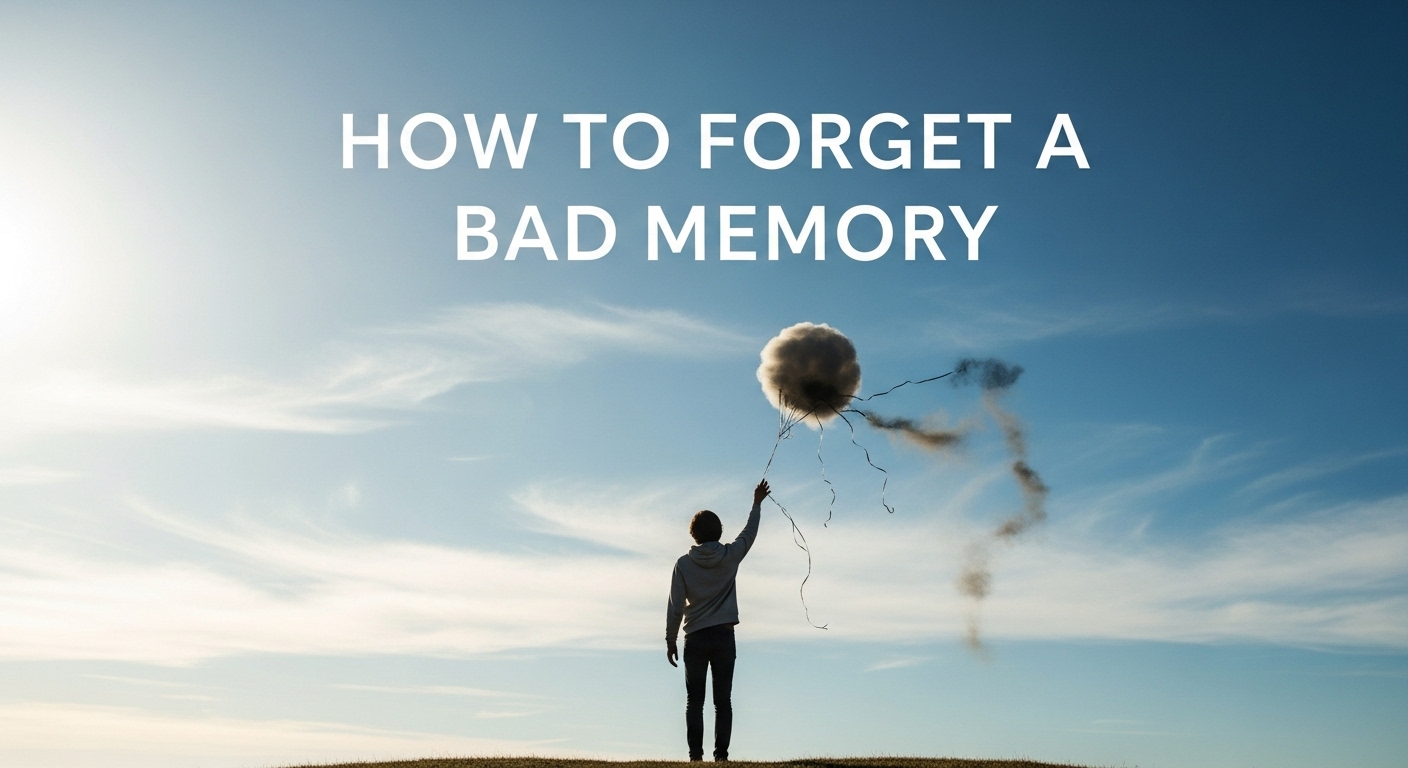Forgetting a bad memory, especially deeply impactful ones, isn’t about erasing them entirely but rather about reducing their emotional sting and learning to live peacefully with their presence. It involves a combination of practical strategies, emotional processing, and, at times, professional support.
Life in Pakistan, like anywhere else, comes with its share of challenges and difficult experiences. Whether it’s a personal setback, a loss, a traumatic event, or even just a deeply embarrassing moment, bad memories can linger, affecting our mood, relationships, and overall well-being. This comprehensive guide will walk you through practical and culturally sensitive ways to forget a bad memory, helping you find peace and move forward.
It’s important to understand that the human brain doesn’t simply “delete” memories. Instead, the goal is to reprocess them, weaken their emotional impact, and prevent them from dominating your present life. This journey requires patience, self-compassion, and consistent effort.
What is a “Bad Memory” and Why Does it Linger?
A “bad memory” refers to a past experience that evokes negative emotions like sadness, anger, fear, guilt, or regret whenever recalled. These memories often linger because they are highly charged emotionally, and our brain tends to prioritize and encode such experiences more vividly. The emotional intensity makes them intrusive and difficult to dismiss.
Our brain’s amygdala, a part involved in processing emotions, especially fear, plays a crucial role in how we store and recall emotional memories. Highly stressful or traumatic events can lead to the amygdala over-activating, causing these memories to feel more intense and immediate, even years later. In Pakistan, where people often face unique social and economic pressures, the burden of such memories can be particularly heavy.
Unprocessed bad memories can manifest in various ways: anxiety, depression, sleep disturbances, difficulty concentrating, strained relationships, and even physical symptoms. They can trigger flashbacks or intense emotional reactions when encountering reminders (triggers), making everyday life challenging. M1any individuals in Pakistan might silently struggle with these issues, often due to social stigma around mental health.
How can I practically reduce the impact of bad memories?
Practically reducing the impact of bad memories involves identifying triggers, actively engaging in distracting and positive activities, and consciously reframing your thoughts. It’s about taking control of your present reactions rather than letting the past dictate them.
Step 1: Identify Your Triggers and Create Distance
Pay close attention to what situations, places, sounds, smells, or even thoughts bring the bad memory to the forefront. Once identified, try to create some distance from these triggers, both physically and psychologically.
Memories are often “cue-dependent,” meaning they require a trigger to be recalled. By understanding and managing your triggers, you gain a sense of control over when and how frequently these memories intrude. This doesn’t mean avoiding life, but rather strategically reducing unnecessary exposure, especially early in your healing journey.
If a certain street or market reminds you of a difficult incident, explore alternative routes or shopping areas. If a particular song brings back painful memories, avoid listening to it for a while. If the memory is tied to a person, consider limiting interaction if feasible, or practicing boundary-setting. For example, if a family gathering consistently brings up an uncomfortable past event, you might politely excuse yourself from certain conversations or focus on engaging with other, more supportive relatives.
Step 2: Practice Mindful Awareness and Acceptance
Instead of fighting or suppressing the memory, acknowledge its presence without judgment. Observe it as a thought or a sensation, letting it pass like a cloud in the sky.
Suppressing memories often gives them more power, making them pop up unexpectedly and with greater intensity. Acceptance, on the other hand, allows you to detach from the overwhelming emotions associated with the memory, gradually reducing its sting.
Engage in mindfulness exercises. When a bad memory surfaces, take a deep breath. Notice the sights, sounds, and smells around you in the present moment – perhaps the call of the azaan, the aroma of karahi, or the feel of your prayer mat beneath your hands. You can simply tell yourself, “This is a memory. It’s in the past. I am here, now.” This grounding technique helps anchor you in the present reality.
Step 3: Reframe Your Narrative
Challenge the negative thoughts and beliefs associated with the memory. Reframe the event from a different perspective, focusing on lessons learned, resilience gained, or even the growth that resulted from the experience.
Our interpretation of an event often impacts us more than the event itself. By changing the narrative, you change your emotional response. This doesn’t mean denying the pain, but rather finding a path to meaning and moving beyond victimhood.
If a business failure in Karachi still haunts you, instead of dwelling on the loss, reframe it as a learning experience that taught you invaluable lessons about market dynamics or financial management. Perhaps that setback led you to a more fulfilling path. Many entrepreneurs in Pakistan face failures but learn from them to build stronger ventures.
How can I process difficult emotions tied to the past?
Processing difficult emotions tied to the past involves allowing yourself to feel them, expressing them constructively, and seeking support from trusted individuals or professionals. This active engagement helps to release the emotional burden.
Step 4: Express Your Feelings (Journaling or Talking)
Find a healthy outlet to express the emotions tied to the bad memory. This could be through journaling, talking to a trusted friend or family member, or seeking professional help.
Bottling up emotions can lead to chronic stress, anxiety, and depression. Expressing them helps to release the emotional charge, allowing for better processing and healing. It he2lps you externalize the burden.
Many Pakistanis find solace in discussing their problems with close family (parents, siblings) or a trusted pir/spiritual guide. If you prefer privacy, maintaining a personal diary can be immensely helpful. You can write down every detail and emotion related to the memory, then review it, noting how your feelings evolve over time. For more severe issues, a therapist (psychologist or psychiatrist) can provide a safe and confidential space. You can find mental health professionals through platforms like Oladoc or local hospitals.
Step 5: Engage in Meaningful Activities and Hobbies
Dedicate your time and energy to activities that bring you joy, purpose, and a sense of accomplishment.
Focusing on positive, engaging activities helps redirect your brain’s attention away from the negative memory. It builds new, positive associations and experiences, gradually “rewiring” your brain and making the old memory less prominent.
Join a local sports club, volunteer for a community project (like helping at a local orphanage or an environmental cleanup drive), learn a new skill (e.g., calligraphy, cooking traditional Pakistani dishes, coding), or immerse yourself in religious practices that bring you peace, such as Quran recitation or zikr. Engaging with your community through social gatherings, daawats, or local events can also provide positive distractions and a strong support system.
Step 6: Practice Self-Compassion and Forgiveness
Treat yourself with the same kindness and understanding you would offer a dear friend. This includes forgiving yourself (if applicable) and others involved in the memory.
Self-criticism and holding grudges only prolong suffering. Forgiveness, both of self and others, is not about condoning what happened but about releasing yourself from the emotional chains of the past. It’s 3a gift you give to yourself.
Reflect on the Islamic teachings of forgiveness (maghfirat) and patience (sabr). Understand that everyone makes mistakes, and growth comes from learning, not from perpetual self-blame. Make dua for yourself and those who may have wronged you, seeking peace and healing. Practice being gentle with yourself, especially during moments when the memory resurfaces.
When should I consider professional help to forget a bad memory?
You should consider professional help in Pakistan if bad memories are consistently interfering with your daily life, causing significant distress, impacting your relationships, or leading to symptoms of anxiety, depression, or PTSD. A mental health professional can provide structured support and evidence-based therapies.
Step 7: Seek Professional Guidance (Therapy)
If the bad memories are persistent, overwhelming, or impacting your daily functioning, consider consulting a qualified mental health professional.
Therapists are trained to help you process traumatic or distressing memories in a safe and structured environment. Techniques like Cognitive Behavioral Therapy (CBT) and Eye Movement Desensitization and Reprocessing (EMDR) are highly effective in reducing the emotional impact of such memories.
Look for certified psychologists or psychiatrists in major cities like Lahore, Karachi, or Islamabad. Many reputable hospitals have psychiatry departments (e.g., Aga Khan University Hospital, Shifa International Hospital, Mayo Hospital). Onlin4e therapy platforms are also gaining traction, offering more accessible options for those in remote areas or who prefer discretion. Don’t5 hesitate to ask about their experience with trauma or memory-related issues. The stigma around mental health is slowly decreasing, and seeking help is a sign of strength.
Can lifestyle changes truly help in moving on from bad memories?
Yes, significant lifestyle changes, including maintaining a healthy diet, regular exercise, adequate sleep, and strong social connections, can profoundly impact your ability to process and move on from bad memories. These changes improve overall mental and physical resilience, making you better equipped to cope.
Step 8: Prioritize Physical Well-being
Ensure you are getting enough sleep, maintaining a balanced diet, and engaging in regular physical activity.
Our mental and physical health are deeply interconnected. A healthy body supports a healthy mind, improving your resilience and ability to cope with stress, including the distress caused by bad memories. Lack of sleep and poor nutrition can exacerbate feelings of anxiety and make memories feel more overwhelming.
Incorporate local, fresh produce into your diet. Aim for 7-9 hours of sleep each night. Engage in activities like brisk walking in a park, playing cricket with friends, or practicing yoga. Many Pakistani communities have walking tracks, local gyms, or parks that offer opportunities for physical activity. Even a daily walk around your neighborhood can make a significant difference.
Step 9: Build a Strong Support System
Surround yourself with positive and supportive individuals who uplift you and provide a safe space to share.
A strong social network provides emotional support, a sense of belonging, and distractions from negative rumination. Knowing you are not alone in your struggles can significantly reduce the burden of bad memories.
Nurture relationships with understanding family members, close friends, or community elders. Attend social gatherings, participate in mosque activities, or join local clubs or online groups that align with your interests. The traditional concept of “biradari” (community/kinship) can be a source of immense support if leveraged positively.
Step 10: Practice Gratitude and Focus on the Present
Make it a daily habit to acknowledge and appreciate the positive aspects of your life, no matter how small. Consciously bring your attention to the ‘here and now’.
Gratitude shifts your focus from what went wrong in the past to what is good in the present. It cultivates a positive mindset, which is crucial for emotional healing and moving forward. Focusing on the present prevents you from getting caught in a loop of past regrets or future anxieties.
Start a gratitude journal, listing 3-5 things you are grateful for each day – it could be something as simple as a warm cup of chai, the beauty of a sunset, or a kind word from a neighbor. During daily activities, try to be fully present: truly taste your biryani, listen to the sounds of the street, or feel the warmth of the sun. This mindfulness helps prevent your mind from drifting back to painful memories.
Are there specific therapies in Pakistan for trauma-related memories?
Yes, specific therapies like Cognitive Behavioral Therapy (CBT) and Eye Movement Desensitization and Reprocessing (EMDR) are available in Pakistan for trauma-related memories. These are evidence-based approaches that help individuals process traumatic experiences and reduce their emotional impact.
How long does it take to truly “forget” a bad memory?
Truly “forgetting” a bad memory in the sense of erasing it entirely is not possible. However, the time it takes to process it and reduce its emotional power varies greatly from person to person. It can take weeks, months, or even years, depending on the severity of the memory, individual coping mechanisms, and the support received.
Can I just ignore a bad memory until it goes away?
Ignoring a bad memory is generally not an effective long-term strategy. While it might provide temporary relief, suppressed memories can resurface with greater intensity or manifest as anxiety, stress, or other mental health issues. A6ctive processing and coping mechanisms are more beneficial for sustainable healing.
What role does spirituality play in healing from bad memories for Pakistanis?
For many Pakistanis, spirituality, particularly Islam, plays a significant role in healing from bad memories. Concepts like sabr (patience), shukr (gratitude), tawakkul (trust in God), and dua (prayer) offer a framework for coping, finding meaning in adversity, and seeking inner peace. Seeking guidance from religious scholars or mentors can also be a source of comfort and resilience.
Can diet and exercise really influence my ability to overcome past trauma?
Absolutely. A healthy diet, regular exercise, and adequate sleep form the foundation of good mental health. They help regulate mood, reduce stress hormones, improve cognitive function, and enhance overall resilience, making it easier for your brain and body to cope with and process difficult memories. Think of it as providing your body the fuel and environment it needs to heal.
Is it normal to still feel sad or angry about a past event even after years?
Yes, it is completely normal to still feel sadness, anger, or other emotions about a past event, especially a traumatic one, even after many years. Healing is not a linear process, and emotions can resurface. The goal is not to eliminate these feelings entirely, but to manage them so they don’t overwhelm your present life and to ensure they don’t lead to chronic distress.
How can I support a loved one in Pakistan who is struggling with a bad memory?
To support a loved one in Pakistan struggling with a bad memory, listen with empathy and without judgment. Encourage them to talk, but don’t pressure them. Offer practical help, distract them with positive activities, and gently suggest professional help if needed, emphasizing that it’s a sign of strength. Respect their pace and cultural sensitivities.
What are some immediate coping techniques when a bad memory strikes unexpectedly?
When a bad memory strikes unexpectedly, immediate coping techniques include grounding yourself by focusing on your five senses (what you see, hear, smell, touch, taste in the present moment), deep breathing exercises (e.g., box breathing), and distracting yourself with a sudden, absorbing activity like counting objects, listening to music, or splash cold water on your face. These help to disrupt the thought pattern and bring you back to the present.
Are there any traditional Pakistani remedies or practices that help with emotional healing?
While not a substitute for professional help, many traditional Pakistani remedies and practices are associated with emotional well-being. These include regular prayer (Namaz), listening to religious sermons (bayanat), participating in Sufi zikr sessions, using traditional herbal remedies (hikmat) for stress relief, spending time in nature, and nurturing strong family and community bonds. Many find solace in reading poetry (Urdu or regional languages) or listening to classical music.
Can talking about the bad memory repeatedly make it worse?
Talking about a bad memory can be helpful for processing, but repeated, unguided rumination or reliving the memory without a constructive purpose can sometimes embed it deeper or prolong distress. The key is to discuss it with a purpose, ideally with a therapist or a trusted, supportive individual who can help you reframe and move forward, rather than just endlessly recounting the pain.
Conclusion
Forgetting a bad memory in Pakistan is a nuanced journey, not a simple act of erasure. It’s about consciously engaging with your past, processing its emotional residue, and building a stronger, more resilient present. By identifying triggers, embracing mindfulness, reframing narratives, expressing emotions, prioritizing physical health, building strong support systems, and, when necessary, seeking professional help, you can reduce the power of painful memories.
Healing takes time, patience, and self-compassion. Just as the Indus River carves its path through the land, your journey of overcoming past difficulties will shape you into a stronger individual, ready to embrace the future with hope and peace.
Resources
Mental Health Services & Support in Pakistan
- Oladoc – Find and book appointments with mental health professionals (psychiatrists, psychologists, and therapists) online.
- Aga Khan University Hospital (AKUH) – Psychiatry Department – Offers specialized mental health services and psychiatric care.
- Shifa International Hospital – Psychiatry Department – Provides counseling, therapy, and psychiatric treatment services.



